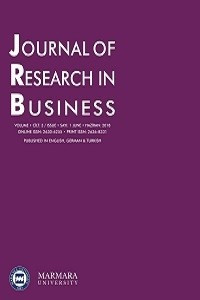HİLE DENETİMİ VE DENETÇİLERİN HİLE TESPİTİNE YÖNELİK BİR ARAŞTIRMA*
Hile, Hile Denetimi, Hilekâr
A STUDY ON FRAUD AUDITING AND DETERMINATION OF THE FRAUD BY AUDITORS
Fraud Fraud auditing, fraudster, auditor,
___
- The Association of Certified Fraud Examiners. (2006-2010-2012-204-2016). Report to the Nation on Occupational Fraud and Abuse, USA. Avrupa Konseyi Yolsuzlukla Mücadele Özel Hukuk Sözleşmesi, 2. Maddesi. Baird, J. E. ve Zelin, R. (2008), “Understanding Employee Perceptions of Fradulent Activitiesand Their Propensity to Report Those Activities Using Anonymous Tip Lines: The Influence of Fraud Type, Propetrator Gender, and Observer Demographics”,Southern Business Review. Biegelmen, M.T. ve Bartow, J. T. (2012). Executive Roadmap to Fraud Prevention and Internal Control Creating A Culture of Complience, New Jersey: John Wiley & Sons. Bircan, G. (2015). “Kar Amaçsız İşletmelerde Hile Denetiminin Önemi”, Mali Çözüm Dergisi, Cilt.25, Sayı.127. Bologna, J. (1984). Corporate Fraud-The Basics of Prevention and Detection, Butterworth-Heinemann, USA. Bozkurt, N. (2011). İşletmelerin Kara Deliği Hile, 2.Basım, Alfa Yayınları, İstanbul. Coenen, T. L. (2008). Essentials of Corporate Fraud. Hoboken, US: Wiley. Çankaya, F. ve Gerekan, B. (2009). “Hile Denetçiliği Mesleği ve Sertifikalı Hile Denetçiliği Mesleki Standartları ve Ahlak Kuralları”, Muhasebe ve Denetime Bakış Dergisi. Çatıkkaş, Ö. Ve Çalış, Y.E. (2010). “Hile Denetiminde Proaktif Yaklaşımlar”, Muhasebe ve Finansman Dergisi, Sayı.45. Dönmez, A. ve Karausta, T. (2015). “Çalışanların Mesleki Hile Algısı ve İhbar Hattı Kullanarak Rapor Etme Eğilimleri Üzerine Akdeniz Üniversitesi İktisadi ve İdari Bilimler Fakültesi’nde Yapılan Bir Araştırma”, Mali Çözüm Dergisi. Sayı.104. Dumanoğlu, S. (2005). “Hata ve Hile Ayrımı: Hile Denetimi”, Marmara Üniversitesi İBBF Dergisi, Cilt XX, Sayı 1. Emir, M. (2008). “Hile Denetimi”, Mali Çözüm Dergisi, sayı:86. Erkan, M. ve Demirel Arıcı, N. (2011). “Hata ve Hile Denetimi: SPK’na Kayıtlı Halka Açık Anonim Şirketlere İlişkin Düzenlemeler”, Muhasebe ve Denetime Bakış Dergisi. Karabayır, M.E. ve Cengiz, S. (2016). Muhasebe Hileleri Yoluyla Yapılan Yolsuzluklarda Bağımsız Denetimin Sorumluluğunun Araştırılması: Kuzeydoğu Anadolu Bölgesi Uygulaması”, Kafkas Üniversitesi İİBF Dergisi, Cilt.7, Sayı.14. Gee, S. (2014). Fraud and Fraud Detection: A Data Analytics Apporoach, Wiley, USA. Goldmann, P. ve Kaufman, H. (2009). Anti-Fraud Risk and Control Workbook, Wiley&Sons, USA. Hacıhasanoğlu, T. ve Karaca, N. (2015). “Potansiyel Muhasebe Meslek Mensuplarının Hile Algısı Üzerine Bozok Üniversitesi’nde Yapılan Bir Araştırma”, Niğde -Üniversitesi İİBF Dergisi. Sayı.8. Kranacher, M. Riley, R. ve Wells, J. T. (2011). Forensic Accounting and Fraud Examination, 1st Edition. Olagbemi, F. O. (2011). The Effectiveness of Federal Regulati¬ons and Corporate Reputation in Mitigating Corporate Accounting. USA: Xlibris Corporation. Özkul Ulucan, F.ve Özdemir, Z. (2011). İşletmelerde Hile Riski Yönetimi, Beta Yayınları, İstanbul. Özkul Ulucan, F. ve Özdemir, Z. (2013). “Çalışan Hilelerinin Önlenmesinde Proaktif Yaklaşımlar: Kurumsal İşletmelerde İnsan Kaynakları Yöneticileri Üzerine Nitel Bir Araştırma”, Marmara Üniversitesi Sosyal Bilimler Enstitüsü Dergisi, Cilt: 10, Sayı:40. Pazarçeviren, S. Y. (2005). “Adli Muhasebecilik Mesleği”, ZKÜ Sosyal Bilimler Dergisi, Cilt 1, Sayı:2. Pedneault, S. Rudewicz, F. Silverstone, H. ve Sheetz, M. (2012). Forensic Accounting and Fra¬ud Investigation for Non-Experts, New Jersey: John Wiley & Sons. Pehlivanlı, D. (2011). Hile Denetimi, Metodoloji ve Raporlama, Beta Yayın, İstanbul. SAS NO:82 ve NO:99, http://www.aicpa.org (Erişim Tarihi: 23.04.2016). Sheridan, T. A. (2014). Managerial Fraud, Gover Yayınevi. Singlenton, T. ve Singleton, A. J. (2010). Fraud Auditimg and Forensic Accounting, 4. Edition, John Wiley & Sons, USA. TDK: http://www.tdk.gov.tr/ (Erişim Tarihi: 15.07.2016). USİUD: http://www.usiud.org (Erişim Tarihi: 15.07.2016). Vona, W.L. (2012). Fraud Risk Assessment: Building a Fraud Audit Program, US: Wiley. Wells, T. J. (2011)a. Corporate Fraud Handbook. Hoboken, US: Wiley. Wells, T.J. (2011)b. Conporate Fraud Handbook: Prevention and Detection, Wiley & Sons. Wolfe, D.T. ve Hermanson, D. R. (2004). The Fraud Diamond: Considering the Four Elements of Fraud, CPA Journal.
- Yayın Aralığı: Yılda 2 Sayı
- Başlangıç: 2016
- Yayıncı: Marmara Üniversitesi
Konaklama Sektöründe Büyük Veri Aracılığıyla Sektörel Rekabette Kültürel Farklılıkların Keşfi
Taskın DİRSEHAN, Nurdan KÖSE, Eylul ERCEVİK, Sena CEYLAN
Ömer Akgün TEKİN, Hilal GUNDOGAN
ÜNİVERSİTE ÖĞRENCİLERİNİN FİNANSAL OKURYAZARLIK DÜZEYLERİ: MARMARA ÜNİVERSİTESİ ÖRNEĞİ
Murat ÇİNKO, Emin AVCI, Sinem ERGUN, Mahmut TEKÇE
HİLE DENETİMİ VE DENETÇİLERİN HİLE TESPİTİNE YÖNELİK BİR ARAŞTIRMA*
